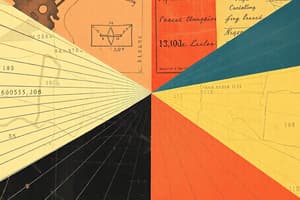Podcast
Questions and Answers
What are skew lines?
What are skew lines?
- Lines that are parallel
- Lines that intersect
- Lines that are coplanar
- Lines that don't lie in the same plane (correct)
Parallel lines must always intersect.
Parallel lines must always intersect.
False (B)
What is Theorem 9-1?
What is Theorem 9-1?
Two parallel lines lie in exactly one plane.
What does Theorem 9-2 state?
What does Theorem 9-2 state?
What is the existence of parallels?
What is the existence of parallels?
What is a transversal?
What is a transversal?
What are alternate interior angles?
What are alternate interior angles?
What is Theorem 9-4?
What is Theorem 9-4?
What does AIP stand for?
What does AIP stand for?
What are corresponding angles?
What are corresponding angles?
What are same-side interior angles?
What are same-side interior angles?
What does CAAI stand for?
What does CAAI stand for?
What does CAP stand for?
What does CAP stand for?
What does SSSP stand for?
What does SSSP stand for?
What is the Parallel Postulate?
What is the Parallel Postulate?
What does PAI state?
What does PAI state?
What does PCA state?
What does PCA state?
What does PSSS state?
What does PSSS state?
What is Theorem 9-10?
What is Theorem 9-10?
What is Parallel Transitivity?
What is Parallel Transitivity?
What is Perpendicular Transitivity?
What is Perpendicular Transitivity?
What is Triangle Angle Sum?
What is Triangle Angle Sum?
What does Convex Quadrilateral describe?
What does Convex Quadrilateral describe?
What is a Parallelogram?
What is a Parallelogram?
What is a Trapezoid?
What is a Trapezoid?
What are the bases of a trapezoid?
What are the bases of a trapezoid?
What is the median of a trapezoid?
What is the median of a trapezoid?
What does the Midline Theorem state?
What does the Midline Theorem state?
What is the Quadrilateral Midpoint Theorem?
What is the Quadrilateral Midpoint Theorem?
What does the Isosceles Trapezoid Theorem state?
What does the Isosceles Trapezoid Theorem state?
What is a Rhombus?
What is a Rhombus?
What is a Rectangle?
What is a Rectangle?
What is a Square?
What is a Square?
What does it mean if a parallelogram has one right angle?
What does it mean if a parallelogram has one right angle?
What is true about the diagonals of a rhombus?
What is true about the diagonals of a rhombus?
What can be concluded if the diagonals of a quadrilateral bisect each other and are perpendicular?
What can be concluded if the diagonals of a quadrilateral bisect each other and are perpendicular?
What is the median to the hypotenuse of a right triangle?
What is the median to the hypotenuse of a right triangle?
What does the converse of 30-60-90 imply?
What does the converse of 30-60-90 imply?
What does Theorem 9-29 state?
What does Theorem 9-29 state?
What does Theorem 9-30 state?
What does Theorem 9-30 state?
What does TMPT state?
What does TMPT state?
Flashcards
Parallel Lines
Parallel Lines
Lines that lie in the same plane and never intersect.
Skew Lines
Skew Lines
Lines that do not lie in the same plane and never intersect.
Transversal
Transversal
A line that intersects two other coplanar lines at distinct points.
Alternate Interior Angles (AIA)
Alternate Interior Angles (AIA)
Signup and view all the flashcards
Alternate Interior Angles Theorem (AIAT)
Alternate Interior Angles Theorem (AIAT)
Signup and view all the flashcards
Corresponding Angles
Corresponding Angles
Signup and view all the flashcards
Same-Side Interior Angles
Same-Side Interior Angles
Signup and view all the flashcards
Corresponding Angles Postulate (CAP)
Corresponding Angles Postulate (CAP)
Signup and view all the flashcards
Same-Side Interior Angles Postulate (SSSP)
Same-Side Interior Angles Postulate (SSSP)
Signup and view all the flashcards
Parallel Postulate
Parallel Postulate
Signup and view all the flashcards
Parallel Alternate Interior Angles (PAI)
Parallel Alternate Interior Angles (PAI)
Signup and view all the flashcards
Parallel Corresponding Angles (PCA)
Parallel Corresponding Angles (PCA)
Signup and view all the flashcards
Parallel Same-Side Interior Angles (PSSS)
Parallel Same-Side Interior Angles (PSSS)
Signup and view all the flashcards
Parallelogram
Parallelogram
Signup and view all the flashcards
Parallelogram Diagonal Property
Parallelogram Diagonal Property
Signup and view all the flashcards
Parallelogram Angle Property
Parallelogram Angle Property
Signup and view all the flashcards
Parallelogram Consecutive Angle Property
Parallelogram Consecutive Angle Property
Signup and view all the flashcards
Parallelogram Opposite Sides Theorem
Parallelogram Opposite Sides Theorem
Signup and view all the flashcards
Parallelogram Opposite Sides Congruence Theorem
Parallelogram Opposite Sides Congruence Theorem
Signup and view all the flashcards
Parallelogram Opposite Angles Theorem
Parallelogram Opposite Angles Theorem
Signup and view all the flashcards
Parallelogram Diagonal Bisector Theorem
Parallelogram Diagonal Bisector Theorem
Signup and view all the flashcards
Rhombus
Rhombus
Signup and view all the flashcards
Rectangle
Rectangle
Signup and view all the flashcards
Square
Square
Signup and view all the flashcards
Trapezoid
Trapezoid
Signup and view all the flashcards
Median of a Trapezoid
Median of a Trapezoid
Signup and view all the flashcards
Isosceles Trapezoid Theorem
Isosceles Trapezoid Theorem
Signup and view all the flashcards
Exterior Angle Theorem
Exterior Angle Theorem
Signup and view all the flashcards
Theorem 9-29
Theorem 9-29
Signup and view all the flashcards
Theorem 9-30
Theorem 9-30
Signup and view all the flashcards
Study Notes
Lines and Angles
- Skew Lines are non-coplanar and do not intersect.
- Parallel Lines are coplanar and do not intersect.
- Theorem 9-1 states two parallel lines lie within exactly one plane.
- Theorem 9-2 asserts that if two lines are both perpendicular to the same line in a plane, they are parallel.
Parallels and Transversals
- At least one line through point P exists that is parallel to line L if P is not on L.
- Transversal is a line intersecting two coplanar lines at two distinct points.
- Alternate Interior Angles (AIA) are formed when a transversal intersects two lines, creating angles that are on opposite sides of the transversal and inside the lines.
- Theorem 9-4 indicates that if a pair of alternate interior angles are congruent, then the other pair will also be congruent.
- If a pair of alternate interior angles are congruent, the lines cut by the transversal are parallel.
Angle Relationships
- Corresponding Angles - angles that occupy the same relative position at each intersection.
- Same-Side Interior Angles - interior angles on the same side of the transversal.
- CAAI suggests that if corresponding angles are congruent, then alternate interior angles are also congruent.
- CAP states if corresponding angles are congruent, the lines are parallel.
- SSSP indicates that if same-side interior angles are supplementary, the lines are parallel.
Postulates and Properties
- Parallel Postulate states through a given point outside a line, only one parallel line exists to that line.
- PAI states alternate interior angles of parallel lines cut by a transversal are congruent.
- PCA indicates correspondence in angles for parallel lines cut by a transversal.
- PSSS asserts that two pairs of same side interior angles in a parallelogram are supplementary.
Geometry of Parallelograms
- Theorem 9-10 declares if a line intersects one of two parallel lines at one point, it will intersect the other as well.
- Parallel Transitivity: If two lines are each parallel to a third line, they are parallel to each other.
- Perpendicular Transitivity: A line perpendicular to one of two parallel lines is perpendicular to the other.
- The Triangle Angle Sum states the total angle measures in any triangle equate to 180 degrees.
Quadrilaterals
- Convex Quadrilateral: no vertices lie on opposite sides of any line that extends a side.
- Parallelogram: quadrilateral where both pairs of opposite sides are parallel.
- Trapezoid: quadrilateral with one pair of parallel sides (the bases).
- Median of Trapezoid: segment connecting midpoints of non-parallel sides is parallel to the base and half its length.
Properties of Parallelograms
- Diagonals bisect each other, and opposite sides are congruent.
- Opposite angles within a parallelogram are congruent; consecutive angles are supplementary.
- If both pairs of opposite sides or angles are congruent, or if the diagonals bisect each other, the quadrilateral is a parallelogram.
Special Types of Quadrilaterals
- Rhombus: all sides congruent; diagonals perpendicular.
- Rectangle: all angles are right angles.
- Square: a rectangle with all sides congruent.
- If a parallelogram has one right angle, it contains four right angles.
Triangles and Angles
- Midline Theorem: mid-segment in a triangle is parallel to the base and half its length.
- Isosceles Trapezoid Theorem states the base angles of an isosceles trapezoid are congruent.
- In any triangle, the measure of an exterior angle is equal to the sum of the two remote interior angles.
Theorems Related to Parallel Lines
- Theorem 9-29: if three parallel lines intercept congruent segments on one transversal, they intercept congruent segments on any parallel transversal.
- Theorem 9-30: three parallel lines intercept congruent segments on one transversal will do so on any transversal.
Studying That Suits You
Use AI to generate personalized quizzes and flashcards to suit your learning preferences.




